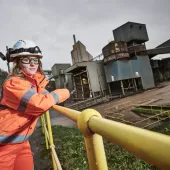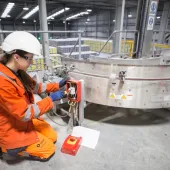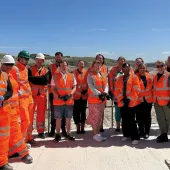Minerals Matter lands a Big Bang
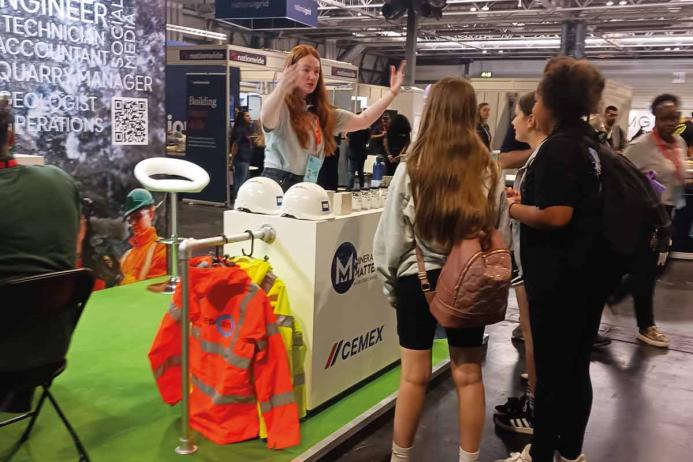
First published in the August 2025 issue of Quarry Management
Engaging, inspiring, and enduring collaboration - Twenty-thousand-three-hundred-and-seventy-nine young people from 402 schools, along with 2,103 of their teachers from across the UK, recently converged on the NEC Birmingham to participate in The Big Bang Fair, the UK’s biggest free STEM science event, organised by EngineeringUK. Minerals Matter debuted at the event, collaborating with three industry partners – Tarmac, Heidelberg Materials UK, and Cemex UK – to raise awareness of career opportunities and the value of the mineral products sector to young people
Exhausting, but amazing’ was the after-show conclusion of Hannah Higley, future careers manager with Minerals Matter. ‘I’m so proud of what we have collectively achieved at The Big Bang Fair, bringing the industry together to share the same mission of inspiring the future generation is what Minerals Matter is all about. It’s been great to connect with teachers, careers leads, and advisors across the country and open their eyes to the industry and possibilities for their students.
‘The industry collaboration and support of Tarmac, Heidelberg Materials UK, and Cemex UK was especially rewarding, demonstrating an energetic partnership for the good of the sector’s future.’
The event provided hands-on workshops, activities, and exciting live shows, bringing science and engineering careers to life. The Big Bang Fair is free to state-funded UK school groups, years 6–8 in England and Wales, P7–S2 in Scotland, and years 7–9 in Northern Ireland.
Phillip McShane, associate director of the Big Bang programme at EngineeringUK, commented: ‘STEM engagement activities like this are vital for inspiring and encouraging young people from all backgrounds to develop a passion for STEM. We know employers are keen to attract diverse young talent, so this was a great opportunity to inspire the next generation to pursue these careers.’
Why Big Bang matters in the career’s education landscape
The need to attend The Big Bang Fair for outreach and the visibility of the sector’s career offers is obvious when set in context of the historic and contemporary state of play of careers advice to young people in the education sector.
The good news is that careers advice for ages 10–13 in the UK is steadily becoming more formalized via new legislation and pilot schemes. Since January 2023, UK law mandates that schools offer impartial careers guidance starting in Year 7 (age 11) and spanning ages 11–18 under the expanded ™ Careers Guidance in Schools Act. Primary school careers programmes have also been introduced in similar years, encouraging early career exposure.
However, implementation remains uneven. Many schools, especially in deprived areas, still fall short of delivering consistent, timely, and expert guidance. Challenges remain, especially around teacher confidence and socio-economic or gender inequalities. Research identifies the need for sustained teacher development, real-world linkages, and early stereotyping work.
A 2023 Careers Development Institute review found careers adviser interviews remain limited with 20% of schools failing to offer a single interview by Year 11.
Studies such as ASPIRES (UCL Institute of Education) tracked children aged 10–14 and found career education is ‘not just ‘patchy’ but patterned’, and the DfE Longitudinal Study (2013–18) of Year 9 students (age 13–14) revealed that 22% rated family advice more useful than schools; only 10% found school advice helpful. Disadvantaged groups found post 16 advice especially lacking.
The Gatsby Benchmarks (especially #4: linking curriculum learning to careers) strongly emphasize embedding STEM within teaching. As of 2021/22, 70% of schools fully met this benchmark (Gov UK).
These highlight both the efficacy of early interventions and persistent disparities. To truly benefit all children, the evidence supports embedding career education early, setting enforced standards, and tackling geographic and socio-economic inequalities.
Most importantly, the cry for careers knowledge is from young people themselves. A 2022 Survation poll (BBC centenary) of 12–18-year-olds found 71% wanted more help, and 42% said school guidance has declined post-pandemic.
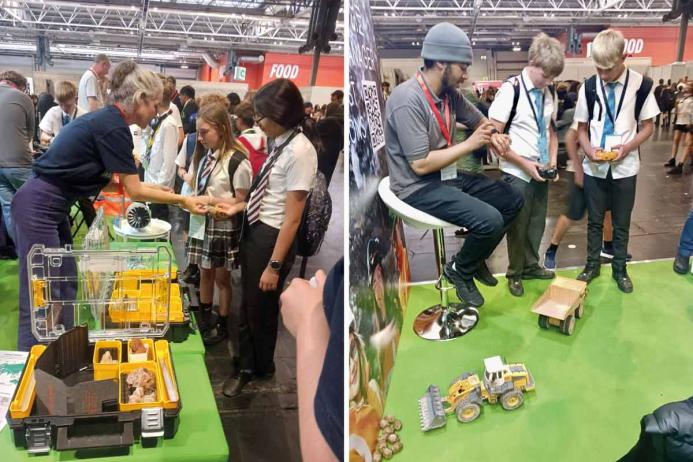
An investment in collaboration
Against this backdrop, Minerals Matter, supported by 35 industry volunteers, engaged young people over three days.
Partnering with Tarmac, Heidelberg Materials UK, and Cemex UK, the interactive stand offered a variety of hands-on STEM activities, making the sector’s innovations, opportunities, and career pathways come to life, and inspiring the next generation of engineers, geologists, and environmental specialists.
The stand featured the ‘Mineral Mission’ activity in conjunction with Future is Mine, which has created innovative challenges where students help to find the missing mineral via a series of clues and challenges.
Jessica Roberts and Loren Crisp, who helped create the activity, said: ‘The concept is that anyone interested in outreach can borrow a box/briefcase from one of five current locations across the UK and then return it. The boxes are specific to critical minerals and come with complete lesson plans and all the materials required to deliver a one-hour session in an educational setting.’
Minerals Matter was also joined by John Austin and David Hindmarsh from The Centre for Mineral Products at The University of Derby, who assisted with the delivery of the Future is Mine activities.
Cemex UK presented ‘Curious Concrete’, an opportunity for students to learn about different minerals used in the production of concrete, showcasing different samples.
‘We demonstrated how we work with and adapt concrete to suit specific uses in order to show not only how versatile concrete is as a building material, but also how essential it is to our communities and the built environment,’ said Chiedza Mupfumira, Cemex UK’s social impact specialist.
Heidelberg Materials UK engaged students with ‘Digging and Driving’, a simulated experience that allowed students to use an excavator to load a tipper truck at a quarry.
‘Students were fascinated and excited about being able to try out operational roles in a quarry using our simulator – fun and educational!’ said Helen Johnson, Heidelberg Materials UK’s recruitment performance and process manager.
Tarmac also utilized digital technology, using VR headsets for their ‘immersive quarry’ experience, where young people were transported to a working quarry environment. Tarmac also highlighted ‘Workwear Ready’, giving students the opportunity to try on a range of protective clothing, essential for safe working on site.
‘We wanted to show how the sector is innovative, responsible, and a gateway to impactful, sustainable careers,’ said Tarmac talent advisor Kirsty McKernan.
The statistical results
Becky Everitt, director of business development and partnerships at EngineeringUK, reported on the headline statistics for the event, noting:
A 14% increase in the number of schools attending The Big Bang Fair 2025 compared with last year, with 63.7% of schools meeting EngineeringUK’s EDI criteria, comprising:
Year 6 (or equivalent) 11%
Year 7 (or equivalent) 41%
Year 8 (or equivalent) 48%
50% of students attending the fair were female
The Midlands accounted for around 65% of visitors.
One-thousand-five-hundred-and-forty-four young people completed the feedback survey, and the evaluation team also conducted student observations for the first time, to get a sense of how students engage with diverse types of content.
Eighty-eight percent of students agreed that they were enjoying The Big Bang Fair, and many young people agreed that the fair:
Had shown them what people working in engineering (84%), technology (85%), and science (81%) do
Made them want to find out more about jobs in engineering (70%), technology (73%) or science (70%)
Made them more interested in a job in engineering (69%), technology (68%) or science (65%).
One-hundred-and-eighty-five educators completed the feedback survey:
98% of educators rated their overall experience of The Big Bang Fair as being excellent or good
96% agreed that the fair was engaging for their students
90% agreed that the fair has clear links to the curriculum
92% agreed that the fair is accessible to students of all abilities
96% agreed that the fair has highlighted the variety of careers in engineering and technology.
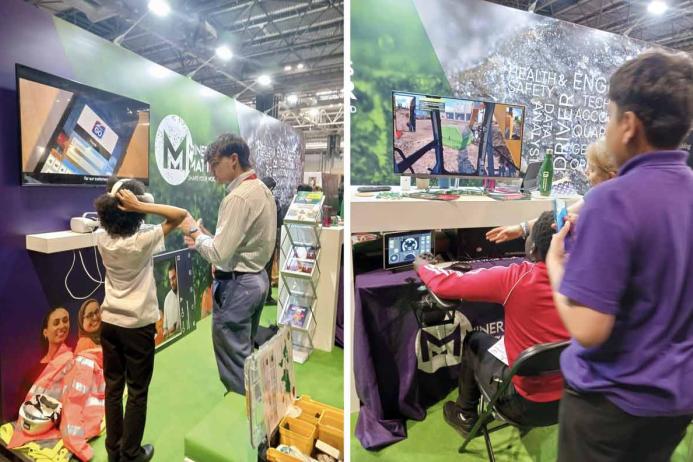
Reflecting on very positive feedback
The experiences of organizers and exhibitors alike reinforced the value of the event.
Moira Shaftoe, head of professional institutions and partnerships at EngineeringUK, applauded the engagement on the Minerals Matter stand, commenting: ‘Huge thanks for taking time to come along to the fair and for the inspiring conversations and engaging activities shared with young people to showcase your sector. By sharing your knowledge and expertise you have opened young minds to exciting career possibilities and helped them see the value of innovation, resource stewardship, and the critical role your sector plays in building a sustainable future for us all. Amazing!’
Helen Johnson, recruitment performance and process manager with Heidelberg Materials UK, said: ‘Really motivating and great to hear and see the younger generation’s reaction to all the information we shared with them as they visited the stand. Amazing to see all the awards the schools and children are getting to ensure a brighter future for us all.’
Chiedza Mupfumira, social impact/strategic communications and sustainability specialist at Cemex UK, said: ‘Thank you to Minerals Matter for creating this opportunity to engage with the future of our businesses. The power of collaboration was evident, and we hope to inspire more minds to explore the wonderful opportunities in our industry.’
Vicky Harrison, training manager, Professional Operator Development Programme (PODP), at Tarmac, said: ‘You could feel the high energy and high interest from the young people, eager to learn and being surprised by what the mineral products sector can offer to their futures.’
Repeat and improve must be the target
To build on the success of The Big Bang Fair it will be critical to maintain a presence for the sector at future Big Bang fairs and other key events.
Lisa Saunders, consultant at Minerals Matter, said: ‘The Big Bang Fair is the best single face-to-face event for the audience we need to reach. The idea was to engage and inspire the young people, so they left feeling enthused and excited about a possible future career within our sector. It was our debut at the event and our stand represented our sector exceptionally well with a diverse group of apprentices and ambassadors present to talk to young people about their experiences.’
James Thorne, chief executive officer of the Institute of Quarrying (IQ) and the Mineral Products Qualifications Council (MPQC), believes regular face-to-face engagement with young people and schools will be essential to maintain the connection between exciting career opportunities and the mineral product sector.
He said: ‘This year we effectively introduced the sector to the young people and to teachers. Longer term, we need to reach the stage where schools are actively seeking out our stand to agree ongoing relationships and opportunities for their students. We gathered details for over 30 schools at the event, and we can now start to build engagement between our ambassador network, businesses, and these schools and education hubs. It is long-term, repetitive encounters with young people that can influence their career choices and place our sector in the minds of future generations of workers.’
Subscribe to Quarry Management, the monthly journal for the mineral products industry, to read articles before they appear on Agg-Net.com


